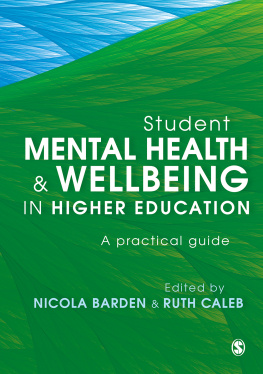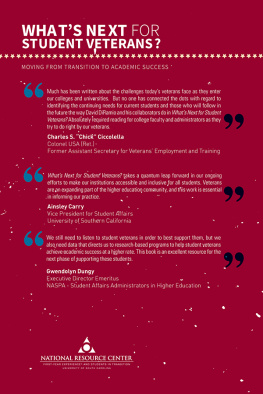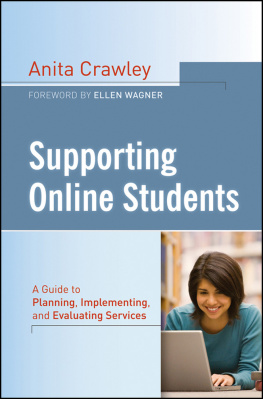ACHIEVING STUDENT SUCCESS
Achieving Student Success
Effective Student Services in Canadian Higher Education
Edited by
DONNA HARDY COX AND
C. CARNEY STRANGE

McGill-Queens University Press 2010
ISBN 978-0-7735-3621-0 (cloth)
ISBN 978-0-7735-3622-7 (paper)
Legal deposit first quarter 2010
Bibliothque nationale du Qubec
Printed in Canada on acid-free paper that is 100% ancient forest free (100% post-consumer recycled), processed chlorine free
McGill-Queens University Press acknowledges the support of the Canada Council for the Arts for our publishing program. We also acknowledge the financial support of the Government of Canada through the Book Publishing Industry Development Program (BPIDP) for our publishing activities.
The authors graciously acknowledge the Canadian Association of College and University Student Services, the Student Affairs and Services Association, and the Educational Leadership Foundation of the American College Personnel Association for their generous support of this project.
Library and Archives Canada Cataloguing in Publication
Achieving student success: effective student services in Canadian higher education / edited by Donna Hardy Cox and C. Carney Strange.
Includes bibliographical references and index.
ISBN 978-0-7735-3621-0 (bnd)
ISBN 978-0-7735-3622-7 (pbk)
1. College students Services for Canada. 2. Student affairs services Canada. 3. Universities and colleges Canada Administration. I. Cox, Donna Gail Hardy, 1961 II. Strange, Charles Carney
LB2342.94.C3A34 2010 378.I940971 C2009-904565-6
Typeset in Sabon 10/12
by Infoscan Collette, Quebec City
Foreword
Achieving Student Success: Effective Student Services in Canadian Higher Education what lofty goals and what a timely focus for Donna Hardy Cox and Carney Strange in their first collaborative book! The title itself captures the primary value of this book and the commitment of the authors and of the profession on which they are focusing: the success of students. But this volume is much more than the sum of its chapters and the collective wisdom of its authors. In its presentation of both the evolution and the current state of the profession of student services in Canada and the celebration of its roots, this book utilizes an approach that is near and dear to the hearts of most student services professionals campus ecology.
Briefly, the ecological approach emphasizes the importance of the interactions among all aspects of the environment physical, human, organizational, and constructed on the behaviour, experiences, and learning of that community and on the relationships among these various components that can help or hinder learning, growth, and development.
In this book, Donna and Carney set the stage for the descriptions of services for students by giving us a synopsis of the underlying historical, philosophical, and theoretical foundations of our work. Only by knowing how our profession evolved in Canada, and the unique forces that shaped it, can one fully appreciate Canadian student services. Somehow it seems right that this book is co-edited by Canadian and American educator-professionals, since much of our own recent professional history has been informed and supported by our USA colleagues. Some of the pioneers of student services in Canada, including Paul Gilmor, Doug Eaton, Fred Nichols, Elspeth Baugh, Bill Stewart, and George McMahon, introduced their campuses to the writings of American academic experts in the newly developing theory about students. By inviting some of these experts to be keynote speakers at our national professional conferences in the 1980s, they provided the opportunity for others to learn what they had discovered in their own professional learning that there was exciting and instructive new information available that could inform and enhance our work with students. Then, in the 1990s, the Canadian Association of College and University Student Services (CACUSS) sponsored Student Affairs Institutes, an annual series of professional education events that also featured renowned US experts, such as Bob Rodgers, Jim Banning, Susan Komives, Elizabeth Whitt, and Gary Hanson, to further enrich our profession and our colleagues. For the first time in our history, there was support and recognition for professional development, for credentials, and for knowledge-based practice about students and student services. The knowledge environment of the student affairs profession was changing in Canada, and these changes and the support that followed them stimulated the development and education of our profession.
As I look at the authors of the various chapters in this book, I am struck by the era they are from an era that was grounded in this new knowledge base and in the professional credentials that emanated from the work of the original pioneers and the generation of professionals and educators who worked with and informed them. The environment for student services on college and university campuses in Canada and the student services profession changed forever in the 1980s. That change and the people who were shaped by it are now in turn educating others. Some of these authors contribute knowledge about their functional or service areas, while others look more broadly at the connections of student services with their institutional missions and in the various educational contexts in which students learn. Some of the more recent structural connections and collaborations for student services in Canada are also examined enrolment management and judicial affairs. Professionals in these areas, who also value and support our students and their learning, are welcome additions to our student services family.
Finally, the co-editors view the practice settings and forms through the lens of strategies and principles for good practice, a theme that connects us all. This order of presentation also parallels the history of the provision of services for students in post-secondary settings in Canada, a history that saw our practice and focus move from separate functional areas to a more central and coordinated connection with our institutional missions and to others in our educational communities. Like our USA colleagues we are refocusing and reshaping our methods and aligning with the commitments and approaches described so well in Learning Reconsidered (Keeling 2004) and Learning Reconsidered 2 (Keeling 2006), and we are taking our rightful place as knowledgeable partners in post-secondary education.
So, as we learn from our colleagues about the structures and strategies important to student success, may we also, as Donna and Carney remind us, remember and honour the roots of this knowledge and the value of sharing it with others. This book does just that. As you read it, bear in mind that it also holds the keys to understanding the future of our profession in Canada, a future which honours and builds on our own ecology and our past accomplishments, and which encourages us to look ahead to discover new models, approaches, and practices. It is exactly this commitment to sustaining our profession and our knowledge that will be required for the 21st century.
To Donna, Carney, and all of the authors of this book, thank you and congratulations. A new era has begun!
Dr Peggy Patterson
Professor, Higher Education Leadership
University of Calgary, Alberta
CACUSS President 199294
Preface
In recent decades, the degree of professionalization has significantly increased in those student services personnel who support student success in Canadian higher education. In terms of both standards for staff performance and expansion of the knowledge base and understanding required to support its work on campus, the student services field has emerged as a primary contributor to the quality and outcome of the Canadian post-secondary experience. While some of this has occurred over time, arguably in response to provincial/territorial and consumer mandates for accountability and efficiency, much of this improvement can also be attributed to the natural evolution of a profession of student services educators intent on achieving its mission of supporting student learning and development as full partners in the academy.
Next page









